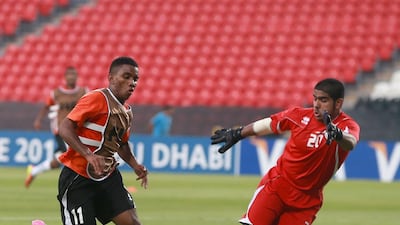As he watched the UAE Under 17 side's penultimate preparations at an almost empty Mohammed bin Zayed Stadium on Tuesday night, a member of the team's back-room staff was asked if the players were excited about the challenge that lies ahead.
“They’re growing impatient,” he said.
“They want it to begin now.”
Their restlessness is warranted. Fifteen months is a long time in anyone’s eyes, but for a group of teenagers not yet old enough to own a driving licence, a yawning period of practice must have felt an eternity. At least they acquired a few additional stamps on their passports.
What began in Turkey on July 8, 2012 has coursed through Saudi Arabia, Spain, Turkey again and Malaysia, before a three-week jaunt to Spain’s Costa del Sol maximised fitness levels and sharpened strategies.
Various training camps around the UAE were dotted between; time used to stockpile game experience and deepen energy reserves.
As the hosts of the 2013 Fifa U17 World Cup arrive, finally, at Thursday night's opening encounter with Honduras, they are primed and irresistibly positive.
“As players, we’re looking to win the tournament,” said Humaid Salmein, the team captain, on Tuesday.
“We’ll try our best to achieve our ambitions as much as we can.”
Yet, while the optimism is understandable, what in fact constitutes a successful tournament for Rashid Amir’s talented group of youngsters?
There is little hard evidence to highlight how the UAE compare at competitive international level.
Two previous appearances at the U17 World Cup are separated by 18 years and offer scant indication.
In 1991, the UAE, then the second best U17 side in Asia, exited the group stage after conceding four goals each to Sudan and Brazil.
Four years ago, having qualified following a semi-final slot at the 2008 Asian U16 Championship, the UAE defeated Malawi in Group E’s initial fixture, but lost to Spain and the United States.
Progressing as one of the pools’ third-best teams, they were defeated in the last 16 by Turkey.
It is difficult to gauge how the Emirates’ current crop will fare.
Granted, results have grown steadily more encouraging as the 15 months have elapsed, and the recent camp in Marbella suggested the UAE can contend with the age group’s more prominent nations.
Draws against the traditionally strong Ivory Coast and Argentina, and reigning world champions Mexico, corroborate the confidence among Amir’s side.
However, under the lights and spectre of expectation, it remains to be seen how the UAE teenagers will react.
In this sense, they are largely untested.
That, though, was the basis for the extended preparation.
Convinced by the previous U17s side’s failure to qualify for Mexico in 2011, the Football Association chose to enter this team into last season’s domestic U19 league.
Then, as their pre-tournament programme evolved, more accomplished international opponents were selected.
It is obvious, too, that as the host country, the UAE will enjoy certain advantages.
There is no need to acclimatise to October conditions and they compete in familiar surroundings.
Yet only once in the tournament’s 26-year history has the home side triumphed.
Partisan support can stir or stifle.
So what in fact constitutes success for the UAE?
Firstly, emerging from a group containing Honduras, three-time-champions Brazil and Slovakia must be celebrated, but for that an opening victory this evening is paramount.
Should they advance, then Nigeria or Mexico, two of the tournament favourites, conceivably await.
However, there is consensus that this age group in particular narrows the gap between the established and the emergent, furnishing the UAE with a vigorous sense of ambition.
“At U17s there is nothing different between the teams,” Salmein said. “All the teams are the same.”
Given an industrious past 15 months, the UAE will hope that is not strictly true.
The time to prove themselves has arrived.
jmcauley@thenational.ae
Follow us on twitter at @SprtNationalUAE


